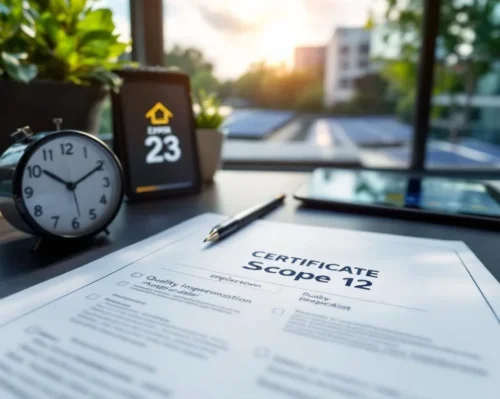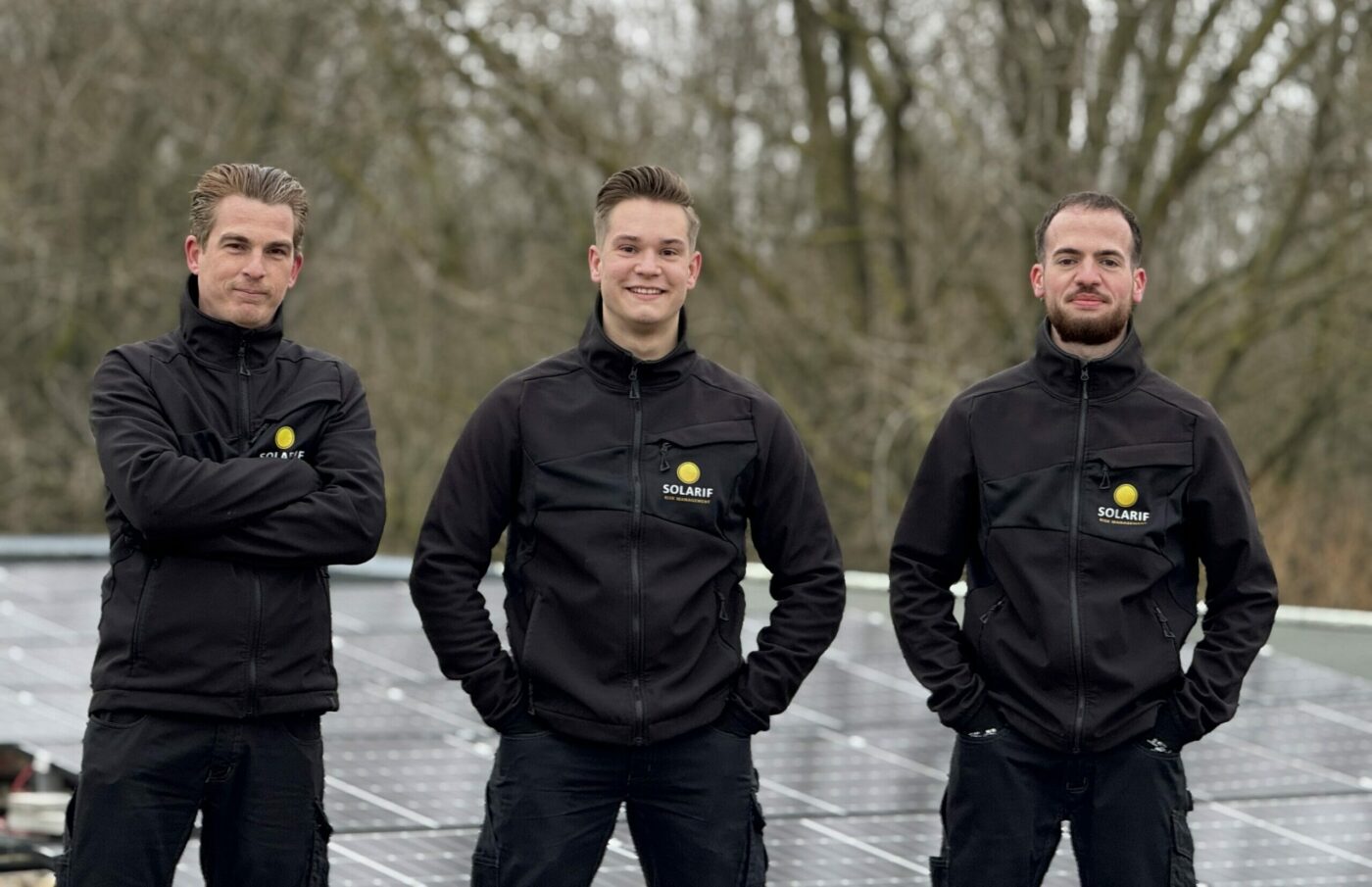What documentation is required before a scope 12 inspection in the Netherlands?
Before a Scope 12 inspection in the Netherlands, you must prepare specific documentation that verifies your solar installation meets safety, quality standards, and installation workmanship requirements. While Scope 12 inspections are not legally mandatory for solar panel installations, they are required by insurance companies if you want to insure your commercial solar project. The documentation includes technical specifications, electrical diagrams, component certificates, installation records, and system compliance documents. Having this paperwork properly organized beforehand ensures a smooth inspection process and helps secure insurance coverage for your business solar installation.

Understanding Scope 12 inspections for solar installations in the Netherlands
Scope 12 inspections are specialized assessments specifically developed for the Dutch insurance industry to evaluate the safety, quality of installation work, and insurability of commercial solar PV installations in the Netherlands. These inspections are conducted by certified SCIOS Scope 12 inspectors who thoroughly examine both the technical documentation and the physical installation.
It’s important to understand that Scope 12 inspections are not legally mandatory for all solar panel installations. However, they are a requirement imposed by insurance companies when you want to insure your commercial solar project. Without a positive Scope 12 inspection report, insurers typically will not provide coverage for commercial PV installations, as they choose not to insure systems that don’t meet safety standards.
Scope 12 differs from Scope 10 inspections, which focus on general electrical safety. Scope 12 is specifically tailored to solar PV installations only and cannot be applied to other forms of renewable energy. You can learn more about Scope 12 inspection procedures here and how they help manage risk in commercial solar projects.

What documentation is required before a Scope 12 inspection?
Before conducting a Scope 12 inspection, you need to prepare a comprehensive set of documentation. This paperwork forms the foundation of the inspection process and must be complete and accurate.
The essential documentation required includes:
- System design documentation:complete electrical diagrams showing the PV system layout, connection points, and electrical pathways
- PV module specifications and certificates (including product warranties)
- Inverter specifications and certificates
- Mounting system documentation and structural calculations
- Electrical component specifications (cables, connectors, isolation switches)
- Electrical installation certificates and testing results
- Declaration of Conformity for major components
- Installation logbook with records of the installation process
- Maintenance records (if the system has been operational)
- Previous inspection reports (if applicable)
- Building permit documentation (if required for the installation)
The inspector will review these documents to verify that all components meet quality standards and that the system design complies with Dutch regulations and industry standards including NEN 1010, NEN 3140, SCIOS Technical Document 18, NEN-EN-IEC 62446-1, and NEN-EN-IEC 61439 before physically examining the installation.

How do you prepare your documentation for a Scope 12 inspection?
Preparing your documentation properly for a Scope 12 inspection requires organization, attention to detail, and completeness. Following these practical steps will help ensure a smooth inspection process:
- Create a dedicated digital folder structure for all relevant documents, organized by category (design, components, certificates, etc.)
- Ensure all documents are complete, up-to-date, and clearly labeled
- Verify that all certificates and declarations are valid and haven’t expired
- Prepare both digital and printed copies of all documentation
- Create a document index or table of contents to help the inspector navigate the materials
- Review all documentation for inconsistencies or missing information before scheduling the inspection
Why is documentation important for a Scope 12 inspection?
Proper documentation is crucial for Scope 12 inspections because it provides evidence that your solar installation meets all necessary safety, quality, and installation workmanship requirements demanded by insurers. Without comprehensive documentation, inspectors cannot verify compliance, potentially leading to inspection failure.
Documentation serves several critical purposes in the inspection process:
- It proves that all components used in the installation meet required quality and safety standards
- It verifies that the system was designed according to current regulations and industry best practices
- It demonstrates that proper installation procedures were followed during construction
- It establishes a baseline for system performance and maintenance requirements
- It provides essential reference material for the inspector to verify the as-built system matches the design
Remember that insurers require Scope 12 inspections with positive outcomes (no findings) before providing coverage. Any issues identified during document review must be resolved before the inspection can be successfully completed and insurance coverage granted.
Common documentation mistakes to avoid
- Providing incomplete electrical diagrams that don’t show all system components
- Missing component certificates or specifications
- Outdated documentation that doesn’t reflect the current state of the installation
- Insufficient detail on critical safety components
- Missing maintenance records for existing installations
By meticulously organizing your documentation ahead of time, you demonstrate professionalism and make the inspector’s job easier, potentially speeding up the inspection process and improving your chances of a positive outcome. For larger systems (>250kW), be prepared for the inspection to take a full day or more.
When is a Scope 12 inspection mandatory for solar installations?
Scope 12 inspections are not legally required for all solar panel installations in the Netherlands. However, they are mandatory if you want to insure your commercial solar installation. This is a crucial distinction to understand when planning solar energy projects.
Insurance companies require Scope 12 inspections because they need verification that the installation meets safety and quality standards before providing coverage. Insurers choose not to insure systems they consider unsafe. Without a positive Scope 12 inspection report, you may face:
- Inability to obtain insurance coverage for your solar installation
- Higher premiums if alternative coverage is available
- Insurance policies with restrictive conditions like fire coverage excluded
- Limited coverage options for your solar assets like no inherent defect coverage
It’s important to note that Scope 12 inspections do not result in insurance discounts. Rather, they are a prerequisite for standard insurance coverage at normal premium rates. The inspection is designed specifically for the insurance industry to assess risk and determine insurability.
In certain cases, insurers may require Scope 12 inspections to be performed more frequently than the standard five-year interval. This is particularly relevant for commercial buildings where business activities are of high value and where an interruption (such as from a fire caused by the solar panel system) would cause significant financial losses. Roofs with solar installations represent a different and typically higher risk profile compared to roofs without installations.
For residential solar installations, Scope 12 inspections are typically not required as these are usually covered under standard home insurance policies. The requirement primarily affects commercial solar projects and larger installations.

Key takeaways about Scope 12 inspection documentation
When preparing for a Scope 12 inspection in the Netherlands, remember these essential points about documentation requirements:
- Complete and accurate documentation is the foundation of a successful Scope 12 inspection
- Documentation must verify both component quality and installation compliance with Dutch regulations and technical standards (NEN 1010, NEN 3140, NEN-EN-IEC 62446-1, NEN-EN-IEC 61439, and SCIOS Technical Document 18)
- Scope 12 inspections are not legally mandatory but are required by insurers for commercial solar installations
- The inspection process was specifically developed for the Dutch insurance industry to assess risk in solar PV installations only
- A positive inspection outcome (without findings) is necessary to obtain insurance coverage
- Any issues identified during document review must be resolved before inspection completion
- Organized, comprehensive documentation demonstrates professionalism and facilitates the inspection process
- Both SCIOS and insurance companies recognize these inspections as valid verification of system safety and quality
Proper preparation of your documentation not only streamlines the inspection process but also helps ensure the long-term safety, performance, and insurability of your commercial solar installation. By understanding and meeting these documentation requirements, you position your solar project for successful insurance coverage and risk management.
So let’s get started
Let our certified SCIOS Scope experts inspect your system and secure your investment. Stay compliant, insurable, and worry-free. Schedule your Scope 12 inspection today!
📧 Email: support@solarif.com
☎️ Telefoon: +31 (0)26 711 5050




